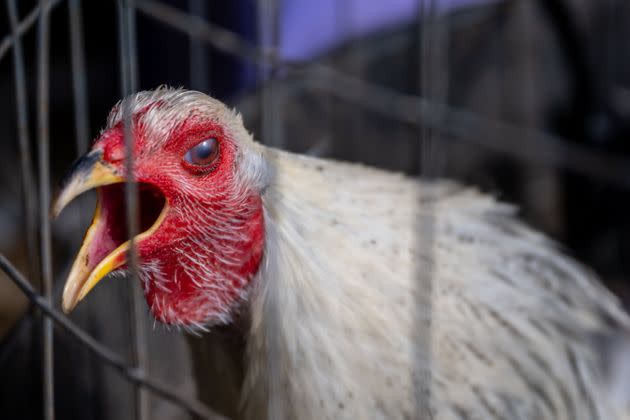Experts Fear Bird Flu Outbreak Could Turn Into New Pandemic
An ongoing outbreak of a deadly avian flu strain has already killed millions of birds, and it’s becoming an even greater cause for concern as it spills over into mammalian species.
“This is an infection that has epidemic and pandemic potential,” Dr. Isaac Bogoch, a Toronto-based infectious disease specialist, told the CBC. “I don’t know if people recognize how big a deal this is.”
The H5N1 avian influenza virus is not brand-new. But previously, it infected mostly birds on poultry farms. In 2020, however, gene-swapping between poultry and wild bird viruses created a “wild bird-adapted” version of the virus, according to the Centers for Disease Control and Prevention. This made it much easier for migrating wild birds to spread the virus to each other and domestic birds in their paths.

A rooster is held in a cage on a farm on Jan. 23, 2023, in Austin, Texas. An avian flu strain is becoming a cause for concern as it spills over into mammalian species.
Since 2022, H5N1 has led to the deaths of more than 58 million domestic birds like chickens, ducks and turkeys in the United States alone. When the deadly virus hits poultry or egg farms ― some of which have more than a million birds on the premises ― the facility typically kills the entire flock to prevent further spread.
In the same time span, there have been nearly 6,000 cases in wild birds in the U.S.
Scientists have also found various wild mammals infected with the virus, including bears, foxes, otters and seals. Since October 2021, there have been five confirmed human cases worldwide and one death, according to the BBC.
Ian Brown, the U.K.’s Animal and Plant Health Agency director of scientific services, told the BBC that he was “acutely aware of the risks” of avian flu turning into a pandemic among humans.
“This global spread is a concern,” he said. “We do need globally to look at new strategies, those international partnerships, to get on top of this disease. If we don’t solve the problem across the globe, we’re going to continue to have that risk.”

A dead pelican, possibly infected with H5N1 avian flu is seen in Lima, Peru on Dec. 7, 2022.
In October, a large outbreak occurred on a mink fur farm in Spain. Researchers who described the outbreak in a paper published last month believe that wild birds initially transmitted H5N1 to the mink farm, but once there, it spread from mink to mink.
“This outbreak signals the very real potential for the emergence of mammal-to-mammal transmission,” Michelle Wille, a wild bird virus researcher at the University of Sydney, told the CBC.
None of the workers, who wore protective gear, at the farm seem to have gotten infected. But some scientists worry that minks could be a kind of stepping stone for the virus to make a jump to humans.
“This is incredibly concerning,” Tom Peacock, a virologist at Imperial College London, told Science Magazine. “This is a clear mechanism for an H5 pandemic to start.”
Journalist Zeynep Tufekci, who has extensively covered the COVID-19 pandemic, wrote in a New York Times opinion piece published this week titled “An Even Deadlier Pandemic Could Soon Be Here.” She also spoke to Peacock, who noted that minks’ respiratory systems make them particularly good host species for viruses that can infect humans.
In her op-ed, Tufekci calls for a slew of cautionary measures, including expanding testing capabilities and ramping up vaccine development and production. She also calls for mink farms to be shut down ― something somecountries have already done due to a combination of animal cruelty concerns and the fact that the farms were also hotbeds for COVID-19.

 Yahoo News
Yahoo News 